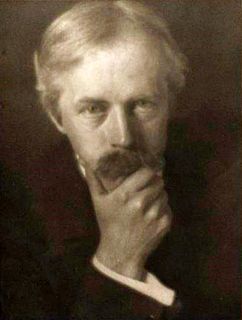Related Research Articles

William Butler Yeats was an Irish poet, dramatist, prose writer and one of the foremost figures of 20th-century literature. A pillar of the Irish literary establishment, he helped to found the Abbey Theatre, and in his later years served two terms as a Senator of the Irish Free State. He was a driving force behind the Irish Literary Revival along with Lady Gregory, Edward Martyn and others.

Arthur William Symons, was a British poet, critic and magazine editor.
The Wanderings of Oisin is an epic poem published by William Butler Yeats in 1889 in the book The Wanderings of Oisin and Other Poems. It was his first publication outside magazines, and immediately won him a reputation as a significant poet. This narrative poem takes the form of a dialogue between the aged Irish hero Oisín and St. Patrick, the man traditionally responsible for converting Ireland to Christianity. Most of the poem is spoken by Oisin, relating his three-hundred year sojourn in the isles of Faerie. Oisin has not been a popular poem with critics influenced by modernism, who dislike its pre-Raphaelite character. However, Harold Bloom defended this poem in his book-length study of Yeats, and concludes that it deserves reconsideration.

Ernest Christopher Dowson was an English poet, novelist, short-story writer, often associated with the Decadent movement.

Oisín, Osian, Ossian, or Osheen was regarded in legend as the greatest poet of Ireland, a warrior of the fianna in the Ossianic or Fenian Cycle of Irish mythology. He is the son of Fionn mac Cumhaill and of Sadhbh, and is the narrator of much of the cycle and composition of the poems are attributed to him.
The Countess Kathleen and Various Legends and Lyrics (1892) is the second poetry collection of W. B. Yeats.
The Song of the Happy Shepherd is a poem by William Butler Yeats.

"The Stolen Child" is a poem by William Butler Yeats, published in 1889 in The Wanderings of Oisin and Other Poems.

The Bab Ballads is a collection of light verses by W. S. Gilbert, illustrated with his own comic drawings. The book takes its title from Gilbert's childhood nickname. He later began to sign his illustrations "Bab". Gilbert wrote the "ballads" collected in the book before he became famous for his comic opera librettos with Arthur Sullivan. In writing these verses Gilbert developed his "topsy-turvy" style in which the humour is derived by setting up a ridiculous premise and working out its logical consequences, however absurd. The ballads also reveal Gilbert's cynical and satirical approach to humour.
— Opening lines from The Waste Land by T. S. Eliot, first published this year
"Down by the Salley Gardens" is a poem by William Butler Yeats published in The Wanderings of Oisin and Other Poems in 1889.
Nationality words link to articles with information on the nation's poetry or literature.
Nationality words link to articles with information on the nation's poetry or literature.
Nationality words link to articles with information on the nation's poetry or literature.
Nationality words link to articles with information on the nation's poetry or literature.
This is a list of all works by Irish poet and dramatist W. B. Yeats (1865–1939), winner of the 1923 Nobel Prize in Literature and a foremost figure in 20th-century literature. Works sometimes appear twice if parts of new editions or significantly revised. Posthumous editions are also included if they are the first publication of a new or significantly revised work. Years are linked to corresponding "[year] in poetry" articles for works of poetry, and "[year] in literature" articles for other works.
Wanderings may refer to:
Songs Sacred and Profane is a song cycle for voice and piano composed in 1929–31 by John Ireland (1879–1962). It consists of settings of six poems by various poets.
In the Faëry Hills, to which the composer gave the alternative Irish title An Suagh Sidhe, is a symphonic poem by Arnold Bax. It was composed in 1909 and was premiered in London in 1910. It is the second of three works that make up a trilogy of symphonic poems with the collective title Eire. The inspiration for the piece was The Wanderings of Oisin by the poet W. B. Yeats, whom Bax greatly admired.
References
- Yeats, William Butler (1889). The Wanderings of Oisin, and other poems (1 ed.). London: Kegan Paul & Co.
- Yeats, William Butler (1990) [1985]. Collected Poems (2 ed.). London: Picador/Pan Macmillan. ISBN 978-0-330-31638-5.